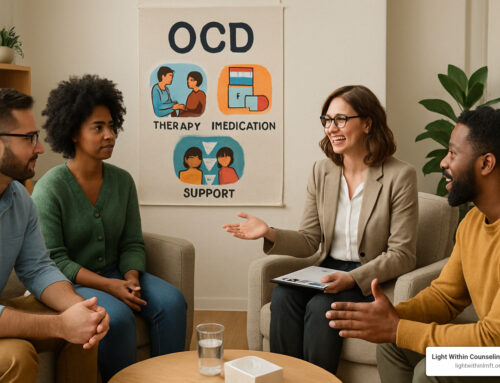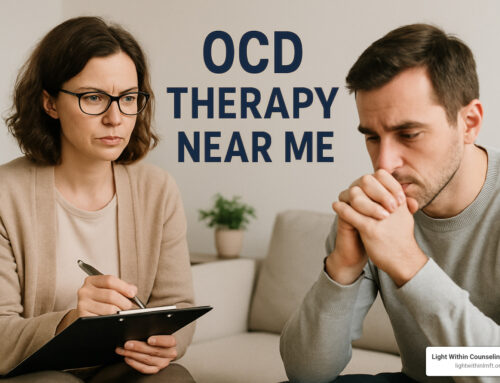
Understanding OCD in Children
Obsessive-Compulsive Disorder (OCD) is a mental health condition characterized by persistent, unwanted thoughts (obsessions) and repetitive behaviors or mental acts (compulsions) performed to alleviate the distress caused by these obsessions. OCD affects approximately 1 in 100 children in the United States. This means that in an average-sized elementary school, there might be four or five children dealing with OCD, and in a medium to large high school, there could be around 20 students with OCD (International OCD Foundation).
Recognizing OCD Symptoms in Children
Children with OCD may experience a range of symptoms that can differ from those seen in adults. Common obsessions in children include fears of contamination, harm coming to themselves or loved ones, and fears of doing something wrong. Compulsions might include excessive handwashing, checking, counting, or seeking reassurance from parents or caregivers.
Diagnosing OCD in children can be challenging because they may not understand or be able to articulate their experiences. Additionally, their behaviors might be mistaken for normal childhood rituals or quirks. Early detection is crucial, as untreated OCD can lead to significant impairment in a child’s daily functioning (CDC) (BMJ Paediatrics Open). For example, a child might avoid certain activities, places, or objects without being able to explain why, or they might become upset or anxious if their routines are disrupted. This video, “Does your child have OCD?” may be helpful for parents.
Common OCD Symptoms in Children:
Obsessions:
- Fear of contamination by dirt, germs, or other substances.
- Worries about harm befalling oneself or loved ones.
- Intrusive thoughts about causing harm or making mistakes.
- Concerns about things being symmetrical or in a particular order.
Compulsions:
- Excessive handwashing, showering, or cleaning.
- Repeated checking of doors, locks, or appliances.
- Counting objects or repeating actions a specific number of times.
- Seeking constant reassurance from parents, teachers, or peers.
- Arranging items in a particular, often symmetrical, manner.
Challenges in Diagnosing OCD in Children
Diagnosing OCD in children can be complex. Children may not understand why they perform certain behaviors or may feel embarrassed and hide their symptoms. Parents and teachers might mistake these behaviors for quirks or phase-related actions, leading to delays in seeking appropriate help. Additionally, the overlap of OCD symptoms with other childhood disorders, such as anxiety disorders or ADHD, can complicate the diagnosis.
Approaches to Support and Treatment
Supporting a child with OCD involves a combination of education, therapeutic intervention, and family involvement.
Education:
- Educate the child and their family about OCD. Understanding that OCD is a medical condition, not a character flaw, can reduce feelings of shame and isolation.
- Teach the child about how OCD works and why their brain sends these troubling thoughts and urges.
Therapeutic Interventions:
- Cognitive Behavioral Therapy (CBT): Specifically, Exposure and Response Prevention (ERP) is the gold standard for treating OCD. ERP helps children gradually face their fears and reduce the compulsive behaviors.
- Medication: In some cases, medication such as selective serotonin reuptake inhibitors (SSRIs) may be prescribed to help manage symptoms.
Family Involvement:
- Families play a critical role in supporting a child with OCD. They should be involved in therapy sessions and learn how to respond to the child’s compulsions and anxiety without reinforcing the behaviors.
- Establishing a supportive home environment where the child feels safe discussing their obsessions and compulsions can make a significant difference.
School Support:
- Educators and school counselors should be informed about the child’s condition. They can provide accommodations, such as extra time for assignments or a quiet place to take breaks, to help the child manage their symptoms in an academic setting.
Understanding OCD in children is the first step toward effective support and treatment. By recognizing the unique ways OCD manifests in young individuals and employing a comprehensive, supportive approach, parents, educators, and therapists can help children manage their symptoms and lead fulfilling lives. Early intervention and ongoing support are key to improving outcomes for children with OCD.
Challenges in Recognizing OCD
One of the biggest challenges in diagnosing OCD in children is differentiating it from other conditions such as autism spectrum disorders (ASD) and tic disorders. OCD symptoms can sometimes overlap with the repetitive behaviors seen in ASD or the involuntary actions characteristic of tic disorders. Accurate diagnosis often requires a detailed assessment by a mental health professional, including a developmental history and separate interviews with the child and their parents (BMJ Paediatrics Open).
Treatment and Support
Effective treatment for OCD typically involves Cognitive Behavioral Therapy (CBT), specifically Exposure and Response Prevention (ERP), and Acceptance and Commitment Therapy (ART). This approach helps children face their fears and reduce their compulsive behaviors. In some cases, medication such as selective serotonin reuptake inhibitors (SSRIs) may also be prescribed to help manage symptoms.
Family involvement is essential in the treatment process. Parents and caregivers should be educated about OCD to support their child effectively. Schools can also play a vital role by providing accommodations and understanding the child’s needs.
Education and Understanding
Take the time to learn about OCD. Many resources are available, including books, reputable websites, and professional counselors specializing in OCD. Understanding the nature of the disorder helps you provide the most effective support and ensures that you can advocate for your child in educational settings or medical appointments. ERP therapy is the gold standard for OCD therapy.
Open Communication
Create a safe and open environment at home where your child feels comfortable discussing their feelings and OCD experiences. It’s crucial for them to know they’re not alone and that they can talk about their obsessions and compulsions without fear of judgment. This support can significantly reduce the feelings of shame and isolation that many children with OCD experience.
Normalizing Symptoms
Normalize the experience of OCD by reassuring your child that, while their feelings and compulsions might be distressing, they are not alone or abnormal. Explain that many people have intrusive thoughts, but in the case of OCD, these thoughts are more intense and persistent. This understanding can help alleviate some of the stigma and self-criticism that children with OCD often face.
Gradual Exposure
Exposure Response Prevention (ERP) is often considered the gold standard for treating OCD. This involves gradually and systematically exposing the child to their fears in a controlled and supportive way, without allowing them to perform their usual compulsions. Start with situations that provoke mild anxiety and gradually work up to more challenging scenarios. This method helps reduce the anxiety associated with obsessions over time.
Using Gentle Language
When discussing OCD symptoms or exposure exercises, always use gentle, supportive, and age-appropriate language. Avoid any language that might sound accusatory or judgmental. For instance, instead of saying, “stop thinking about that,” you could say, “let’s think about this together.”
Encouraging Coping Strategies
Teach your child coping strategies that can help them manage anxiety when facing OCD triggers. Techniques such as deep breathing, mindfulness, relaxation exercises, and positive self-talk can be very effective. Encourage your child to use these strategies during exposure exercises and in daily life.
The Importance of Praise and Encouragement
Children with Obsessive-Compulsive Disorder (OCD) often struggle with intense and overwhelming thoughts and behaviors, which can lead to feelings of frustration, anxiety, and helplessness. Providing regular praise and encouragement can significantly impact their mental health and treatment progress. Celebrating their efforts, no matter how small, and focusing on their progress rather than setbacks can boost their confidence and motivate them to continue facing their fears. By acknowledging their efforts, celebrating small victories, emphasizing progress, and using positive reinforcement, parents and caregivers can help children build confidence and resilience in managing their symptoms. Consistent support and encouragement foster a positive environment that empowers children to confront their fears and continue making progress in their treatment. This link has a great video on common questions and answers regarding supporting a child with OCD. These livestreams are a great resource for parents with children with OCD
Boosting Confidence and Motivation
Acknowledging Efforts:
- It’s essential to recognize and praise children for their efforts in confronting their fears and resisting compulsions. This acknowledgment can be as simple as verbal praise, a hug, or a high-five. For instance, if a child with contamination fears touches a door handle without washing their hands immediately, praising them for this brave step can reinforce positive behavior.
- Example: “I’m so proud of you for touching the door handle today without washing your hands right away. That’s a big step!”
Celebrating Small Wins:
- Celebrate every small victory, whether it’s completing an exposure exercise, expressing their feelings, or trying a new coping strategy. These small wins accumulate and contribute to long-term progress.
- Example: “You did a great job today by not asking for reassurance about your homework. Keep it up!”
Reinforcing Progress Over Perfection:
- Emphasize progress rather than perfection. Children with OCD might have days when their symptoms are more challenging to manage. Highlighting their overall progress helps them stay motivated and reduces the pressure to be perfect.
- Example: “I know today was tough, but you’ve made so much progress over the past month. Remember how hard it was for you to even think about this a few weeks ago?”
Using Positive Reinforcement:
- Implementing a reward system can be effective. Rewards don’t have to be extravagant; they can include extra playtime, a favorite snack, or a special activity. The key is consistency and ensuring the child understands what behaviors are being rewarded.
- Example: Creating a sticker chart where the child earns a sticker for each successful completion of an exposure task, leading to a larger reward after a certain number of stickers are earned.
Strategies for Providing Praise and Encouragement
Be Specific:
- Provide specific feedback about what the child did well. Instead of general praise like “Good job,” specify the behavior, e.g., “I noticed you checked the lock only once tonight. That’s great progress!”
Encourage Self-Praise:
- Teach children to recognize and celebrate their achievements. Encouraging self-praise helps build internal motivation and self-esteem.
- Example: Ask the child to share what they are proud of at the end of the day and celebrate it together.
Stay Positive During Setbacks:
- Setbacks are a natural part of the recovery process. Respond to setbacks with understanding and positivity, reinforcing the idea that it’s okay to have tough days and that improvement takes time.
- Example: “It’s okay that today was hard. Look at how much you’ve achieved already. Tomorrow is a new day to try again..
Setting Realistic Goals
Work with your child to set achievable goals for managing their OCD. Break down these goals into small, manageable steps, and ensure that the child understands and agrees with these goals. Celebrate every bit of progress, as this will encourage them to continue working towards managing their symptoms.
Modeling Healthy Behaviors: The Role of Parents in OCD Treatment
When a child is undergoing treatment for Obsessive-Compulsive Disorder (OCD), the involvement of parents in seeking treatment and learning to show up differently is crucial. Modeling healthy behaviors not only aids in the child’s recovery but also fosters a supportive environment where effective coping strategies can thrive. This aspect of treatment is often overlooked but is essential for the holistic well-being of both the child and the family.
Why Parental Involvement Matters
Children Learn by Observation:
- Children are keen observers and often imitate the behaviors and attitudes of the adults around them. When parents model healthy ways of managing stress and anxiety, they provide a powerful example for their children to follow. This modeling can include demonstrating healthy coping mechanisms, such as deep breathing, mindfulness, and positive self-talk.
Creating a Supportive Environment:
- A supportive home environment is critical for the success of OCD treatment. When parents participate in therapy and learn about the disorder, they can better understand their child’s experiences and challenges. This understanding enables them to respond with empathy and support rather than frustration or misunderstanding.
Consistency in Treatment:
- Consistency is key in managing OCD. When parents align their behaviors with the therapeutic strategies being taught to their child, it reinforces the child’s learning and helps integrate these strategies into daily life. This can include participating in exposure exercises or implementing behavioral plans at home.
Practical Ways Parents Can Model Healthy Behaviors
Seek Treatment for Themselves:
- Parents dealing with their own stress, anxiety, or mental health issues should seek treatment. This not only helps them manage their own well-being but also sets a positive example for their child. Therapy or counseling can equip parents with the tools they need to support their child effectively.
Engage in Stress-Relief Activities:
- Demonstrating stress-relief activities such as exercise, meditation, or hobbies shows children that it is okay to take time for self-care. Parents should openly discuss these activities with their children, explaining how they help manage stress and maintain mental health.
Practice Open Communication:
- Encouraging open and honest communication about feelings and challenges helps normalize discussions about mental health. Parents should model this by talking about their own feelings and coping strategies in an age-appropriate way.
Participate in Family Therapy:
- Family therapy can be a valuable component of OCD treatment. It allows the entire family to learn about the disorder, develop healthy communication patterns, and work together to support the child’s treatment plan.
Avoid Enabling Behaviors:
- While it may be tempting to accommodate a child’s compulsions to reduce their immediate distress, it can reinforce the OCD cycle. Parents should work with therapists to understand how to support their child without enabling compulsive behaviors.
Benefits of Modeling Healthy Behaviors
Building Resilience:
- Children who see their parents handling stress and anxiety in healthy ways are more likely to develop resilience. They learn that it is possible to manage difficult emotions and situations effectively.
Enhanced Treatment Outcomes:
- When parents actively participate in treatment and model healthy behaviors, it can lead to better treatment outcomes for the child. Consistent reinforcement of therapeutic strategies at home complements the work done in therapy sessions.
Improved Family Dynamics:
- Family dynamics can improve significantly when everyone is working together towards common goals. Understanding and empathy increase, reducing conflict and creating a more harmonious home environment.
The importance of parents seeking treatment and learning to show up differently cannot be overstated when their child is undergoing OCD treatment. By modeling healthy behaviors, parents not only support their child’s recovery but also foster a resilient and supportive family environment. This holistic approach is essential for the long-term well-being of both the child and
Therapy at Light Within Counseling
At Light Within Counseling, we understand the unique challenges faced by children with OCD and their families. If you look looking for an OCD therapist near me, look no further. Light Within Counseling offers exposure therapy for OCD. Our comprehensive approach involves:
- Individualized Therapy: Tailored treatment plans that incorporate Cognitive Behavioral Therapy (CBT), Acceptance and Commitment Therapy (ART) and Exposure and Response Prevention (ERP) to help children manage their symptoms effectively.
- Family Involvement: We emphasize the importance of family involvement in the treatment process. Our therapists work closely with parents to educate them about OCD and train them in supportive strategies that can be implemented at home.
- Supportive Environment: We create a safe and supportive environment where children can express their feelings and work through their obsessions and compulsions without fear of judgment.
- School Collaboration: We collaborate with educators to ensure that children receive the necessary accommodations and support in their academic environment.
By integrating these elements into our treatment plans, we aim to empower children with OCD and their families to manage symptoms effectively and improve their quality of life. If you or someone you know is struggling with OCD, contact Light Within Counseling today to learn more about our services and how we can help.
Additional Resources for Parents:
This Parenting Survival podcast may be helpful & this podcast, the anxiety toolkit podcast
5 Must-Read Books for People Struggling with OCD
The SPACE program TED Talks
Books and manuals for parents:
Breaking Free of Child Anxiety and OCD: A Scientifically Proven Program for Parents 1st Edition by Eli R. Lebowitz



